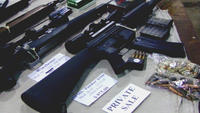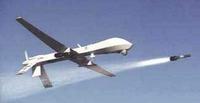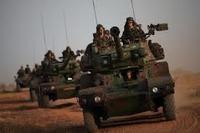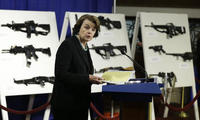-
Majority of Americans -- gun owners and non-gun-owners -- support stronger gun laws

Gun violence claims 31,000 U.S. lives each year in the United States, and the rate of firearms homicides in America is twenty times higher than it is in other economically advanced nations. A new national public opinion survey conducted by researchers at the Johns Hopkins Bloomberg School of Public Health found that the majority of Americans support a broad array of policies to reduce gun violence. For many policies, there was little difference in support between gun owners and non-gun-owners.
-
-
Twitter’s information policy frustrates police, delights customers
Twitter’s robust approach to customers’ privacy has caused consternation among law enforcement agencies, who say that Twitter’s refusal to hand over information on users of the service, except in rare cases, has frustrated criminal investigations. Twitter’s user, though, appreciate the company’s scruples.
-
-
Military electronic devices disappear into the surroundings after use

Electronic devices have become necessary for military operations, but it is almost impossible to track and recover every device. At the end of operations, these devices are often found scattered across the battlefield and might be captured by the enemy and repurposed or studied to compromise DoD’s strategic technological advantage. New DARPA program — Vanishing Programmable Resources (VAPR) program — seeks transient electronics, that is, devices which would maintain the current functionality and ruggedness of conventional electronics, but, when triggered, be able to degrade partially or completely into their surroundings.
-
-
Biometric workshop studied voice, dental, oral standards
The National Institute of Standards and Technology (NIST) hosted a workshop to discuss proposed supplements to the biometric data format standard that support voice recognition, dental and oral data, disaster victim identification, and special data needs for mobile ID applications.
-
-
U.S. to build drone base in Niger

With the war in Mali raging, the U.S. Africa Command is now establishing a drone base in northwest Africa in order to bolster U.S. surveillance – and operational — capabilities against Islamist groups in the region. Initially, the drones flying from the base will conduct unarmed surveillance missions, but there is little doubt that if targets present themselves, these drones will be equipped with missiles and go on hunting-killing missions.
-
-
Laser scanner documents crimes scenes quickly, accurately
The Carlsbad, California police is using a new laser scanner to capture what happened at crime scene. Thenew technology cuts the time it takes to document a crime scene, from the size of the room to the bullet holes in the wall, by up to 80 percent.
-
-
DoD to use connections to stay ahead of cyber threats
The Department of Defense (DoD) maintains one of the largest computer networks in the world. The network follows DoD personnel across the globe collecting, transferring, and processing information in forms as diverse as data warehouses, in-the-field mobile devices, and mission computers on board F-18’s. New program looks at how information is connected and moves to uncover and prevent targeted attacks.
-
-
French forces push deep into north Mali, capture Gao

French military forces, supported by Malian forces, continue to push north into Islamist-controlled north Mali, and on Saturday captured the strategic city of Gao. French prime minister Jean-Marc Ayrault said that having chased the Islamists out of the Gao region, the French force was closing in on Timbuktu, north Mali’s main city. The initial phase of the military operation consists of liberating the large population centers of north Mali from Islamist control, and chasing the jihadists into the empty desert – and do so before the rainy season begins in March.
-
-
U.S. bolsters its military capabilities in the Gulf

The United States has bolstered its military capabilities in the Gulf by stationing six stealth F-22 Raptors at the al Dafra air base, 150 miles from Iran. The F-22 is the most advanced plane in the U.S. arsenal – and also the most expensive, at about $150 million a plane. The F-22 can carry eight smart bombs which it can simultaneously direct at four different targets on the ground – and do so at supersonic speed while evading enemy’s radar.
-
-
Nebraska lawmakers look to limit police drone use
The Federal Aviation Administration says there will be around 30,000 commercial and government drones flying over the United States in the next ten years. The business of selling and servicing domestic drones is projected to grow into a $90 billion industry. Lawmakers at the federal and state level say that to prevent these drone from encroaching on citizens’ privacy, it is time to define what they can do, where, and when.
-
-
“Live burns” to benefit research and firefighter training
Fire researchers from the National Institute of Standards and Technology (NIST) and colleagues from fire service organizations will turn abandoned wood-frame, single-family houses near the site of an old Spartanburg, South Carolina, textile mill into proving and training grounds for new science-driven fire-fighting techniques. The objective of the study is to improve firefighter safety and effectiveness.
-
-
Active-shooter training programs for local law enforcement
Active-shooter training sessions have been in high demand as law enforcement agencies have increased the attention they pay school security after the Sandy Hook Elementary mass shooting. More than twenty-four officers from various northern California law enforcement agencies participated in a two-day active shooter training course funded by DHS.
-
-
Lawmaker unveils bill banning sale, manufacturing of 157 types of semiautomatic guns

Senator Dianne Feinstein (D-California) yesterday unveiled the details of legislation that would ban the sale and manufacture of 157 types of semiautomatic guns and magazines holding more than ten rounds of ammunition. The bill would exempt firearms used for hunting and would grandfather in some guns and magazines. The senator said the bill aims “to dry up the supply of these weapons over time.”
-
-
NRA leader tells gun owners Obama does not understand them
Reacting to President Obama proposals for tighter gun controls, Wayne LaPierre, the executive vice president of the National Rifle Association (NRA), told gun owners on Tuesday that President Obama does not understand them. He said the president wanted to institute a national registry of firearms so he can tax or confiscate their weapons.
-
-
New imaging technique for identifying the age and sex of a corpse
Researchers have developed a new technique for identifying the age and sex of a corpse. It is based on a computing system which relies on free software, and has a reliability of 95 percent.
-
More headlines
The long view
AI-Controlled Fighter Jets May Be Closer Than We Think — and Would Change the Face of Warfare
Could we be on the verge of an era where fighter jets take flight without pilots – and are controlled by artificial intelligence (AI)? US R Adm Michael Donnelly recently said that an upcoming combat jet could be the navy’s last one with a pilot in the cockpit.
What We’ve Learned from Survivors of the Atomic Bombs
Q&A with Dr. Preetha Rajaraman, New Vice Chair for the Radiation Effects Research Foundation in Hiroshima and Nagasaki, Japan.
Need for National Information Clearinghouse for Cybercrime Data, Categorization of Cybercrimes: Report
There is an acute need for the U.S. to address its lack of overall governance and coordination of cybercrime statistics. A new report recommends that relevant federal agencies create or designate a national information clearinghouse to draw information from multiple sources of cybercrime data and establish connections to assist in criminal investigations.
Autonomous Weapon Systems: No Human-in-the-Loop Required, and Other Myths Dispelled
“The United States has a strong policy on autonomy in weapon systems that simultaneously enables their development and deployment and ensures they could be used in an effective manner, meaning the systems work as intended, with the same minimal risk of accidents or errors that all weapon systems have,” Michael Horowitz writes.
Twenty-One Things That Are True in Los Angeles
To understand the dangers inherent in deploying the California National Guard – over the strenuous objections of the California governor – and active-duty Marines to deal with anti-ICE protesters, we should remind ourselves of a few elementary truths, writes Benjamin Wittes. Among these truths: “Not all lawful exercises of authority are wise, prudent, or smart”; “Not all crimes require a federal response”; “Avoiding tragic and unnecessary confrontations is generally desirable”; and “It is thus unwise, imprudent, and stupid to take actions for performative reasons that one might reasonably anticipate would increase the risks of such confrontations.”
Luigi Mangione and the Making of a ‘Terrorist’
Discretion is crucial to the American tradition of criminal law, Jacob Ware and Ania Zolyniak write, noting that “lawmakers enact broader statutes to empower prosecutors to pursue justice while entrusting that they will stay within the confines of their authority and screen out the inevitable “absurd” cases that may arise.” Discretion is also vital to maintaining the legitimacy of the legal system. In the prosecution’s case against Luigi Mangione, they charge, “That discretion was abused.”
